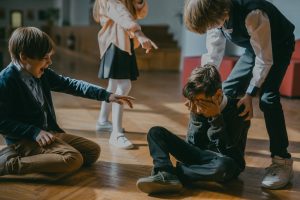
Integrating Real-Life Experiences and Flexibility: The Art of Living Learning Homeschooling in the UK
Understanding the Principles of Living Learning Homeschooling
A living learning homeschool is an educational approach that extends beyond the boundaries of traditional classrooms. It is based on the idea that learning is not confined to textbooks and lectures but can be integrated into everyday life. This approach recognises that children are naturally curious and can learn through exploration, play, and real-world experiences.
Living learning homeschooling emphasises the importance of child-led learning. Instead of following a rigid curriculum, parents or educators encourage children to pursue their interests and passions. They provide resources, guidance, and support to facilitate learning in areas that capture the child’s enthusiasm. By adopting this approach, children develop a genuine passion for learning and take active responsibility for their education.

Living learning homeschooling recognises that the learning environment isn’t confined to a classroom but encompasses the whole world. It emphasises hands-on experiences, field trips, and interactions with the community. Children can learn from nature, engage in cultural activities, and explore their local surroundings. This approach promotes holistic development and encourages critical thinking, problem-solving, and creativity.
Designing a Flexible and Child-Led Homeschooling Environment
Flexibility and allowing children to lead their learning are core principles of living-learning homeschooling. Designing a homeschooling environment that supports these principles can significantly enhance a child’s educational journey. Here are some critical considerations for creating a flexible and child-led homeschooling environment.
Firstly, providing various resources and materials that cater to the child’s interests and learning style is essential. This could include books, educational games, art supplies, scientific equipment, and access to technology. By offering a diverse range of resources, children have the freedom to explore and pursue their passions.
Secondly, organising the physical space is crucial for creating an environment that supports independent learning. Providing designated areas for different activities, such as reading, experimenting, and creating, can help children focus and engage in self-directed learning. Flexibility in the physical arrangement allows for easy adaptability as children’s interests evolve.
In addition to physical space, time flexibility is equally important. Child-led homeschooling allows children to learn at their own pace and according to their interests and strengths. Setting aside dedicated time for self-directed exploration and learning while incorporating structured learning activities strikes a balance between flexibility and necessary structure.
Encouraging collaboration and socialisation are essential elements within a child-led homeschooling environment. Encouraging peer interactions, whether through homeschooling groups, community activities, or online communities, provide opportunities for children to learn from one another, share experiences, and develop social skills.
Incorporating Field Trips and Real-World Experiences in Living, Learning Homeschooling
Field trips and real-world experiences are vital in enriching the educational journey of children engaged in living-learning homeschooling. These experiences go beyond the boundaries of textbooks and classrooms, providing tangible and authentic learning opportunities. Incorporating field trips and real-world experiences is crucial in living-learning homeschooling.

Firstly, field trips bring learning to life by providing firsthand experiences that deepen understanding and spark curiosity. Whether visiting museums, historical sites, farms, or nature reserves, children can engage with their surroundings and gain a deeper appreciation for different subjects. Field trips offer multisensory learning experiences that stimulate all facets of a child’s development.
Real-world experiences, such as internships, volunteering, or apprenticeships, expose children to practical applications of their knowledge and skills. By working alongside professionals or engaging in community service, children gain valuable insights into various professions, develop real-life problem-solving abilities, and cultivate a sense of social responsibility.
Incorporating field trips and real-world experiences also helps children develop critical life skills. They learn to navigate new environments, adapt to different situations, and interact with diverse groups of people. These experiences foster independence, self-confidence, and resilience.
Field trips and real-world experiences can be integrated into the curriculum and tailored to individual interests and learning goals. Parents or educators can collaborate with local organisations, businesses, and experts to design enriching experiences that align with the child’s passions and academic objectives.
Balancing Structure and Spontaneity in Living Learning Homeschooling
One unique challenge in learning homeschooling is finding the right balance between structure and spontaneity. While design provides a framework and ensures progress, spontaneity encourages exploration, creativity, and the pursuit of individual interests. Here are some strategies to achieve a harmonious balance between structure and spontaneity in living-learning homeschooling.
- Firstly, it is essential to establish a flexible routine that provides a sense of structure without being overly rigid. A consistent daily or weekly schedule helps children understand discipline and responsibility. However, allowing room for flexibility within this routine is equally essential, accommodating spontaneous learning opportunities or interest changes.
- Setting clear learning goals and objectives provides a roadmap for structured learning. This can be done in collaboration with the child, ensuring their interests and aspirations are considered. Establishing short-term and long-term goals helps maintain focus and provides a sense of direction while allowing for spontaneous detours.
- Incorporating various learning methods and resources also contributes to striking a balance between structure and spontaneity. This could include a mix of textbooks, online courses, hands-on projects, and free exploration. By offering diverse learning experiences, children can follow their passions while acquiring foundational knowledge.
- Regular reflection and assessment allow for ongoing evaluation of the learning process. This helps identify areas with more structure or greater flexibility, and spontaneity can be encouraged. By involving the child in this reflective process, they become active participants in their education and develop metacognitive skills.
Positive Impact of Living Learning Homeschooling
Living learning homeschooling has a profound positive impact on children’s education and overall development. This unconventional approach offers numerous advantages to their academic success, personal growth, and well-being.
One of the significant benefits of living-learning homeschooling is the individualised and personalised learning experience it provides. Children can tailor their education to their unique learning styles, interests, and abilities. This fosters a love for learning and enhances their engagement and motivation. With personalised attention and support, children can progress at their own pace, reinforcing a sense of accomplishment and self-confidence.

Living learning homeschooling also nurtures solid parent-child relationships. Through daily interactions and shared learning experiences, parents or guardians can connect deeply with their children. This close bond fosters open communication, trust, and emotional well-being. It also allows parents to provide moral and ethical guidance, instilling essential values and life skills.
The flexibility inherent in living learning homeschool enables children to explore their interests beyond traditional subjects. They can delve into topics that spark their curiosity, pursue in-depth studies, and develop a deep understanding of subjects that resonate with them. This promotes critical thinking, creativity, and a passion for lifelong learning.
Moreover, the real-world experiences and field trips integral to living learning homeschooling broaden children’s horizons and provide practical applications for their knowledge. Children develop empathy, cultural awareness, and social responsibility by engaging with the community, nature, and cultural activities.
Living learning homeschooling also offers a safe and supportive environment that allows children to grow and develop at their own pace. It reduces the adverse effects of peer pressure and fosters a positive self-image. Children can pursue their passions without fear of judgment, fostering a sense of autonomy and self-determination.





